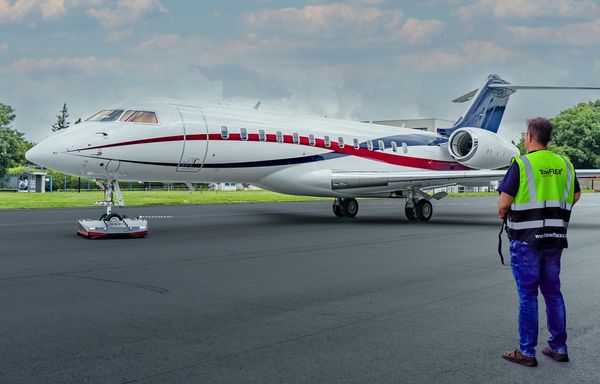Cosmic Aerospace, a startup developing an electric aircraft, raised $4.5 million in funding earlier this month. The company is currently working on the aircraft's design after building and successfully testing its engine.

Background and Product
Cosmic Aerospace is an aerospace startup that aims to facilitate air travel without carbon emissions. The company was founded by people with extensive experience in the aerospace industry. Cosmic plans to build the world's first electric aircraft with a maximum range of 1,000 kilometers (621 miles). This aircraft can fly much farther than the electric planes currently on the market.
Cosmic's aircraft, the Cosmic Skylark, will have a similar range to traditional commercial jets with lower costs and more environmental benefits. The Cosmic Skylark can accommodate 24 passengers and three crew members on short-haul flights powered completely by electricity. The plane's high range is possible due to its propulsion system, unique wing design, lightweight structure, and the ability to operate on today's batteries.
Cosmic is focusing on creating an efficient airframe and propulsion system design that does not require advances in electric batteries. The drawback with electric aviation is that batteries are not yet advanced enough to operate large electric aircraft with hundreds of passengers across long distances. Batteries are low in energy density, meaning storing enough electric energy at a low enough weight for long-haul commercial flights is impossible.
.jpg)
Many aviation stakeholders are using sustainable aviation fuel (SAF) to decarbonize their flight operations. Although SAF can reduce carbon dioxide (CO₂) emissions by up to 80 percent, hydrogen and electric aircraft can also reduce aviation's environmental impact. The International Energy Agency (IEA) estimated that aviation comprised approximately 2% of global CO₂ emissions in 2022. The industry has adopted a goal of reaching net zero emissions by 2050.
Cosmic decided to design a more efficient aircraft instead of waiting decades for batteries to become advanced enough for the widespread adoption of electric aviation. The company has already built and tested the engine for the Cosmic Skylark. Cosmic plans to operate its full-scale demonstrator's first flight in 2026 and initiate commercial service by 2030.
.jpg)
$4.5 Million in Seed Funding
On February 6, Cosmic Aerospace raised $4.5 million in seed funding to develop its product further. The seed round involved companies investing in climate tech and deep tech startups. Pale Blue Dot, a venture capital (VC) firm focused on climate tech, led the seed round. Other VC firms that participated in the financing include Aera VC, Possible Ventures, and Syndicate One.
Joel Larsson, General Partner and Co-Founder at Pale Blue Dot, said about the seed round:
"We are incredibly impressed by the pragmatic development approach the team at Cosmic has demonstrated and are convinced that this is the right way forward to enable a truly meaningful decarbonization of aviation. We are excited to back Cosmic and believe the team has what it takes to lead the aviation industry into a sustainable future."
.jpg)
Future Plans
Cosmic has outlined multiple future plans aside from finishing the development of the Cosmic Skylark. The company plans to establish partnerships with airlines and other aviation-related entities to get its product out to more customers. Cosmic also aims to receive certification from the European Union Aviation Safety Agency (EASA) for its aircraft in the coming years. Although Cosmic is based near Denver, its engine development facility is at Limburg Regional Airport near Brussels.
Air France Announces Paris-Las Vegas Nonstop Service » Inside IndiGo's Game-Changing Order for 30 Airbus A350 Aircraft » PHOTOS: Inside Gulfstream's New G800, the World's Longest-Range Business Jet »
Comments (1)
 Randy Orr
another misinformation piece. 1. Batteries will never be light enough to be useful in aircraft. So electric aircraft are a technology going nowhere. 2. electricity in most places is generated by fossil fuels. So electric aircraft are not 'without carbon emissions". 3. SAf can reduce carbon emissions by 'up to' 80%, but as the fuel is based on carbon sources, it does not. - in fact it might increase the carbon footprint.
The big story here is someone wasted 4.5 million dollars.
Randy Orr
another misinformation piece. 1. Batteries will never be light enough to be useful in aircraft. So electric aircraft are a technology going nowhere. 2. electricity in most places is generated by fossil fuels. So electric aircraft are not 'without carbon emissions". 3. SAf can reduce carbon emissions by 'up to' 80%, but as the fuel is based on carbon sources, it does not. - in fact it might increase the carbon footprint.
The big story here is someone wasted 4.5 million dollars.
Add Your Comment
SHARE
TAGS
NEWS Cosmic Aerospace Belgium Colorado Electric Aviation Electric Aircraft Future Innovation Technology Sustainable Aviation Sustainability FinanceRECENTLY PUBLISHED
 This Delaware Firm is Saving FBOs Millions in Hangar Costs
When most people picture innovation in the aerospace industry, they envision new airline or aircraft startups that revolutionize the way people travel. But sometimes, the biggest revolutions happen on the ground. One Delaware-based aviation firm is quietly shaping the way airports, FBOs, and MROs move aircraft, and saving them millions of dollars in the process.
STORIES
READ MORE »
This Delaware Firm is Saving FBOs Millions in Hangar Costs
When most people picture innovation in the aerospace industry, they envision new airline or aircraft startups that revolutionize the way people travel. But sometimes, the biggest revolutions happen on the ground. One Delaware-based aviation firm is quietly shaping the way airports, FBOs, and MROs move aircraft, and saving them millions of dollars in the process.
STORIES
READ MORE »
 Air France Announces Paris-Las Vegas Nonstop Service
Air France is expanding its US operations with a new nonstop service from Paris to Las Vegas, significantly enhancing travel options between these two cities. This strategic move not only benefits travelers but also promises economic growth and cultural exchange, while positioning Air France as a key player in the competitive transatlantic market.
ROUTES
READ MORE »
Air France Announces Paris-Las Vegas Nonstop Service
Air France is expanding its US operations with a new nonstop service from Paris to Las Vegas, significantly enhancing travel options between these two cities. This strategic move not only benefits travelers but also promises economic growth and cultural exchange, while positioning Air France as a key player in the competitive transatlantic market.
ROUTES
READ MORE »
 PHOTOS: Inside Gulfstream's New G800, the World's Longest-Range Business Jet
Inside Gulfstream's new G800, showcased at NBAA-BACE 2025.
STORIES
READ MORE »
PHOTOS: Inside Gulfstream's New G800, the World's Longest-Range Business Jet
Inside Gulfstream's new G800, showcased at NBAA-BACE 2025.
STORIES
READ MORE »


